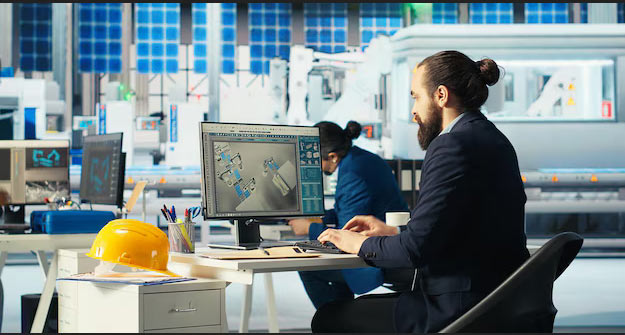Construction ERP Software: Top Features, Costing, Efficiency, And Benefits
If you are a construction industry manager or owner, you will relate to what I say next. Supplier cement trucks haven't been loaded, site teams call for clarifications, GST paperwork piles up, and the spreadsheet with quotations is scattered across multiple Excel files. That work chaos is costing you time & money.
Construction ERP software changes this completely. It brings procurement, vendor management, finance, BOQ, and site updates into one place. When workflows live centrally, teams stop firefighting and start finishing projects on time.
Even the market forecasts show strong demand for ERP for construction industry (expected to reach $28 billion by 2028).
In this guide, we explain what a construction ERP is, its key features, and how to select the best one for your needs.

Construction ERP Software
Construction ERP software is an industry-specific ERP built for contractors, builders, and civil works firms. The purpose of a construction ERP is to simplify daily workflows.
Unlike off-the-shelf business ERPs that handle simple inventory, it connects every moving piece.
For example, when Site A runs low on steel bars, the system shows available stock at Site B or triggers automatic reorders. Just like that, it integrates project accounting, contract management, quality control, procurement, BOQ and tender management, inventory, and HR into a single system. It also manages safety reporting, GST compliance, plant & costs for multiple projects and sites.
A generic ERP system is product-based, which handles limited functions. But, with an ERP system for construction company, you can:
Improve collaboration with stakeholders on a centralized platform.
Gain real-time visibility in stock movements and sales
Automate manual workflow and save time, resources, and money.
Streamline document and contract management.
Prepare cost ledgers, payroll sheets for labourers, and other staff.
Stay compliant with tax and labour laws.
By integrating data from various departments, an ERP system for construction company serves as a data hub, helping improve decision-making at the top level.
What Are The Best Construction ERP Options In India?
Adoption of ERP software for construction industry in India is going to rule 57.6% market share in the coming years. Because generic ERPs are ‘not niched enough’ to handle multi-site projects, vendor performance, project pipelines, costs, and hundreds of other responsibilities.
When choosing the best construction ERP systems, Indian companies often look at three things:
Affordability. Software should fit the budget without hidden costs.
Scalability. The system must handle growth — from one site to ten.
Localization. Features should adapt to Indian tax laws, labor norms, and reporting formats.
And you get that in one-stop solution - EKKLAYA ERP.
Top Construction ERP Options in India
1. Eklavya ERP - Built for Indian Construction Companies
Built specifically for the construction industry, Ekklya brings your projects, finances, and people into one system.
At Ekklaya, we focus on ERP solutions built specifically for construction companies in India. Our USP lies in balancing local know-how with global-grade ERP features. Plus, with real-time dashboards and Power BI integration, leaders don't just see data — they see decisions waiting to be made.
What makes Eklavya different:
Handles complex GST scenarios across multiple states automatically
Integrates with government portals for seamless compliance reporting
Supports regional languages and local business practices
Scales from small contractors to large infrastructure companies
Includes specialised modules for Indian construction workflows
SAP Business One for Construction
Enterprise-grade solution with comprehensive functionality. High implementation costs and complexity make it suitable mainly for large contractors with dedicated IT teams.
Oracle NetSuite Construction
Cloud-based platform with good project management features. International focus means additional customisation will be needed for Indian regulations and tax compliance.
Tally ERP with Construction Add-ons
Popular for accounting, but with limited project management capabilities. Works for small contractors focused mainly on financial tracking rather than comprehensive project control.
Microsoft Dynamics 365 for Construction
Strong integration with the Microsoft ecosystem. Requires significant customisation for Indian construction industry requirements and compliance needs.
Of course, global players also dominate this space. So, why choose us? Because most of them are built for global markets first, and Indian construction firms often need heavy customization to make them fit local realities. Ekklaya fills that gap by offering proven results at reasonable pricing. For more details, contact us here.

What Features Should You Look For In A Construction ERP System?
Instead of opting for the fanciest popular ERP that won’t even help with daily operations and comes with a huge learning curve, opt for a friendly & customizable construction ERP software. Invest in features that directly drive project success and ROI.
Key features to look for include:
Project costing and budgeting. Helps track actual vs. projected costs in real time.
Procurement and inventory control. Ensures the right materials reach the site when needed.
GST and compliance tracking. Keeps filings accurate and lowers audit risks.
Mobile access. Let's site teams log progress, issues, and materials on the go.
Dashboards and reporting. Turns raw project data into actionable insights for better forecasting.
HR and payroll integration. Simplifies workforce management and attendance tracking.
Customisable Workflows and Reports. Every construction company operates differently. The best ERP for construction industry adapts to your existing processes rather than forcing workflow changes.
In short, the features you choose should directly connect to outcomes: fewer late deliveries, less idle time, faster invoicing, and more substantial margins. That's where ROI shows up.
What Are The Benefits Of ERP In The Construction Industry?
The real benefits of a construction ERP software show up daily in operations. Here’s how it makes life simpler:
1. Reduce Rework from Material and Quality Issues
Wrong materials cause expensive rework. Around 70% of rework costs are due to a lack of coordination, communication, and proper documentation.
Best construction ERP software links approved specifications directly to purchase orders. When suppliers deliver different grades of steel than specified, the system flags mismatches before materials reach the site.
Quality control becomes systematic rather than random. Inspection schedules tie into project milestones so concrete testing happens at proper curing intervals, not whenever someone remembers.
2. Faster Invoice Processing and Improved Cash Flow
Manual invoice processing takes weeks and delays payments. Construction ERP software India automates three-way matching between acquisition orders, delivery receipts, and invoices. This way, teams get instant alerts about changes.
3. Control Project Costs Before They Escalate
Cost overruns kill project margins. Real-time cost tracking shows when projects approach budget limits. Suppose the cement used in construction is going higher than the standard ratio. The ERP will alert the concerned project managers so that they can investigate immediately, rather than discovering overruns too late to recover.
4. Fewer late deliveries and lower idle time on site
ERP gives you a live view of materials, labor, and equipment. That means fewer reworks, idle crews waiting for deliveries, and more projects finishing on schedule.
5. Reduced GST and compliance risk
GST, labor laws, and safety regulations are a headache to track manually. ERP software for construction industry handles complex tax scenarios automatically. Inter-state material transfers, e-bills, GST invoicing, tax credits, audits, everything can be done on one system.
6. Improve Resource Utilization Across Projects
Contractors often rent equipment while owning similar machines sitting idle at other sites. ERP contractors see resource availability across all projects and optimize allocation accordingly.
Moreover, your idle skilled technicians or workers can be deployed at different sites. Suppose construction work starts simultaneously at multiple sites. One project is big, another needs less manpower. The system will auto-match the workforce as per specific requirements.

How To Implement And Customize ERP For Construction Companies?
Rolling out an ERP system in construction is less about plugging in software and more about planning it around your business. Start with a clear roadmap: outline your project goals, budget, and processes that need fixing. This step helps you avoid scope creep later.
Next comes vendor selection. Don't just pick the biggest name. They might not be the right fit. Look for providers who specialize in ERP software for construction companies, understand industry workflows, and can scale with your projects. Ask for case studies, client references, and a real demo.
Once you've selected the ERP, the setup phase begins. This includes migrating existing data, configuring modules for things like project costing or equipment management, and customizing dashboards to match how your teams actually work.
But even the best ERP setup will fail without people using it correctly. Training is critical. Involve project managers, site engineers, and finance teams early. Make the learning hands-on and role-specific so adoption feels natural.
How Long Does It Take To Implement Construction ERP Software?
On average, implementing construction ERP software takes three to six months for mid-sized companies. Larger enterprises with multiple sites or those requiring heavy customisation can expect a timeframe of nine months to a year.
The timeline depends on factors like how complex your current systems are, how much data needs to be migrated, and how quickly your teams adapt to training.
Common delays come from underestimating data cleanup, skipping pilot testing, or not dedicating enough internal resources. With proper planning and strong vendor support, the process can be faster and smoother, but it’s realistic to budget extra time for fine-tuning.
How To Choose The Best ERP For A Construction Company?
Want the best construction ERP software that fits your company's workflows, budget, and long-term goals? Here is a step-by-step checklist to follow:
Step 1: Map your needs.
List out your non-negotiables - project tracking, budgeting, customer relationship management (CRM), compliance, fleet management, or HR. An ERP built for construction should cover these natively.
Step 2: Check scalability.
Your projects (and team) will grow. Make sure the ERP can handle multiple sites, bigger budgets, and more users without breaking down.
Step 3: Evaluate TCO (Total Cost of Ownership).
Don't just look at license fees. Factor in implementation, training, maintenance, and upgrades. A slightly higher upfront cost may save money in the long run.
Step 4: Test before you commit.
Demos and trial runs reveal if the software is user-friendly and fits your workflow. If your site teams won't use it, it's not the right one.
Step 5: Check industry expertise.
Before choosing a vendor, look for their past experience, client portfolio, and product reviews. Look at who's using it successfully in your region or sector.
Step 6: Confirm support and updates.
Select a vendor that offers strong onboarding, ongoing support, and regularly updates the system to meet the current industry needs.

How Do Contractors And Builders Use ERP?
Contractors and developers in India and abroad utilize construction ERP software for everyday repetitive tasks that would have taken hours to complete manually. It helps with functions like:
Vendor management and onboarding, with supplier master data and certificates.
BOQ-led budgeting and tendering.
Inventory tracking and material issuance to the site.
GST, e-way bills, and invoices for tax filing
Delivery tracking and PO-to-invoice reconciliation.
W-I-P tracking against the original scope.
Lifecycle management from subcontractor qualification to final payments.
Note: Developers typically focus on a single large project with dedicated teams. Hence, they choose the ERP that prioritises sales, customer handovers, and accounting for finished inventory. If you are a contractor, choose a construction ERP system that emphasises BOQ, subcontractor flows, plant and equipment, job costing, and on-site progress capture.
Frequently Asked Questions About Construction ERP Software
Construction ERP software is an all-in-one system that helps builders and contractors manage projects, budgets, materials, and teams in one place. What differentiates it from a regular ERP is that it addresses industry-specific functions like site activities, costs, finances, and compliance.
An ERP software for construction industry comes with tools like cloud access, real-time financial tracking, project planning, mobile reporting, and customisable dashboards. These features help construction teams manage projects, budgets, and site operations more efficiently